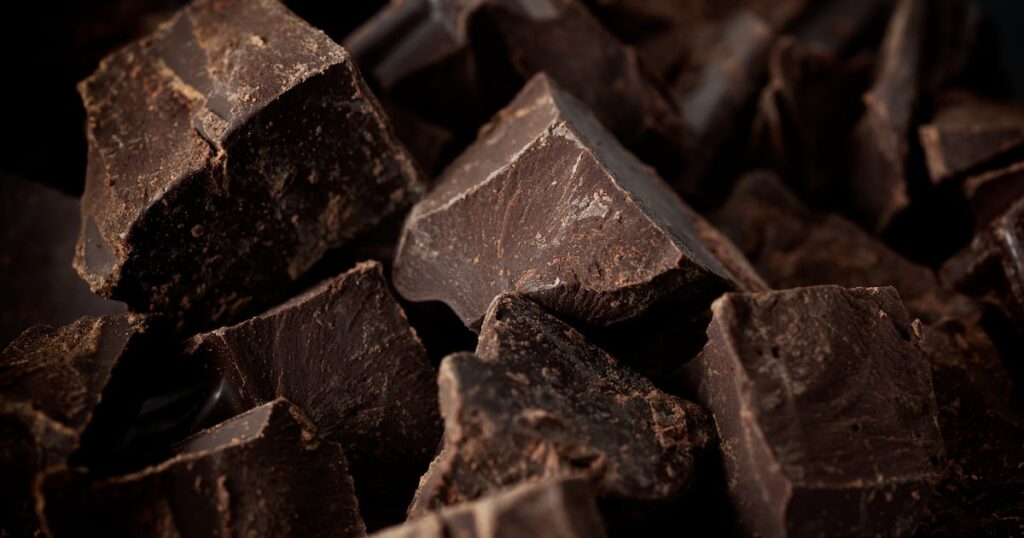Researchers in Singapore investigated whether dark chocolate (DC) can influence metabolic processes involved in adenosine diphosphate (ATP) resynthesis—which is critical for repeated high-intensity muscle contractions—in order to enhance sprint performance.
“Athletes, sports practitioners and coaches may consider implementing DC prior to training workouts and competitions to enhance sporting performance,” the researchers concluded.
Epicatechin and theobromine’s role in reducing fatigue and oxidative stress
Dark chocolate has attracted interest because it contains compounds such as epicatechin and theobromine, which have been shown to support cardiovascular function. Epicatechin helps reduce free radical production and increases nitric oxide to improve blood flow, and theobromine may lower oxidative stress.
Endurance and high-intensity anaerobic exercise both produce oxidative stress, but anaerobic efforts also cause rapid lactate and hydrogen ion build-up, which leads to muscle fatigue and soreness. The antioxidant and vasodilatory properties of cocoa flavonoids may help limit this stress and delay fatigue.
Previous research has found that high-cocoa dark chocolate improved endurance performance and blood flow and reduced physical and mental fatigue. However, authors of the new studies noted that research has yet explored whether dark chocolate can enhance anaerobic performance.
Dark chocolate flavonoids delay fatigue in exercise
The researchers conducted a randomized, single-blinded, crossover design with 20 healthy adults between the ages of 21 and 35 who each completed two test sessions. They measured height, weight, body composition and heart rate (HR) at baseline.
Participants were were injury-free for six months, medication-free and regularly active, maintaining consistent physical activity and diet throughout the study.
During the intervention period, they consumed either 300 mL of dark chocolate milk (containing 30.64% cocoa powder with polyphenols such as theobromine, catechins and procyanidins) or 300 mL of milk with white chocolate flavoring. DC contained 8.7 g of sugar and 1.3 g of fat, whereas WC contained 4.3 g of sugar and 3.8 g of fat.
Participants completed sprint tests consisting of six 35-meter sprints with 10 seconds passive rest in between, 1.5 hours after supplementation. The researchers recorded heart rate and rate of perceived exertion (RPE) after the second, fourth and sixth sprint. After a four-minute rest, participants completed a second sprint test.
Results showed that participants ran faster in the second sprint test after drinking dark chocolate. On average, their sprint times were quicker (6.43 seconds versus 6.62 seconds), and their total time to complete the entire set was shorter (38.58 seconds versus 39.72 seconds).
“Minor changes (0.5–1.5%) in sporting performance are considered vital for elite athletes to determine a personal best or medal placing at international meets,” the researchers wrote.
They explained that the flavonoids in dark chocolate likely increased nitric oxide (NO) production, promoting vasodilation, improving oxygen delivery and increasing stroke volume. Its sucrose content also likely provided rapid glucose and fructose for glycolysis, supplying immediate ATP, whereas flavonoids supported sustained ATP production through improved blood flow.
“This synergistic effect of sucrose and flavonoids seems to have a positive role in performance,” the researchers wrote, noting cardiovascular biomarkers would have provided more direct evidence of the underlying physiological mechanisms and strengthened the link between nitric oxide production, delayed fatigue and performance improvements.
For future study, they called for investigation of dark chocolate’s short- and long-term effects, noting that significant physiological changes may require longer and more consistent consumption.
Source: Nutrients. doi: 10.3390/nu17213317. “Effects of Dark Chocolate on Physiological and Anaerobic Performance Among Healthy Female and Male Adults”. Authors: Balasekaran et al.

